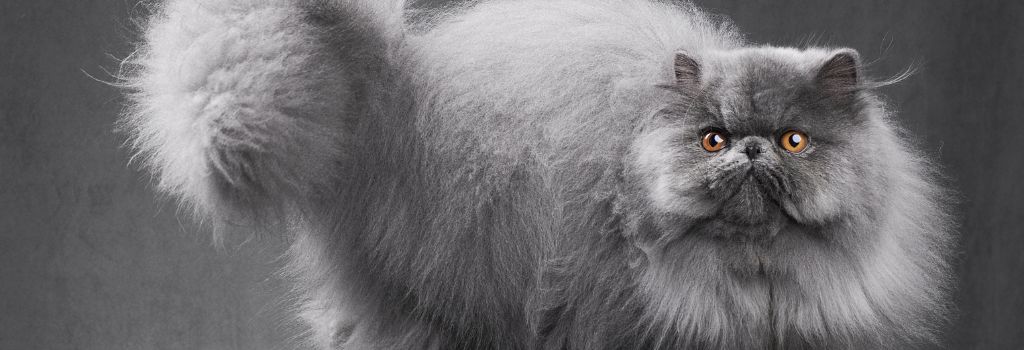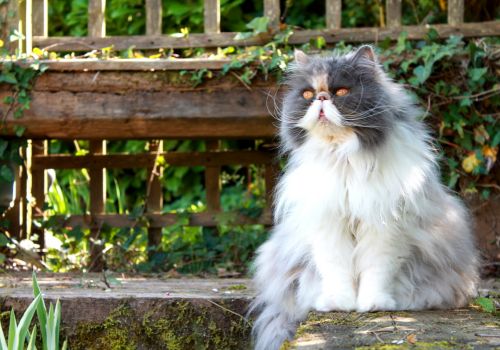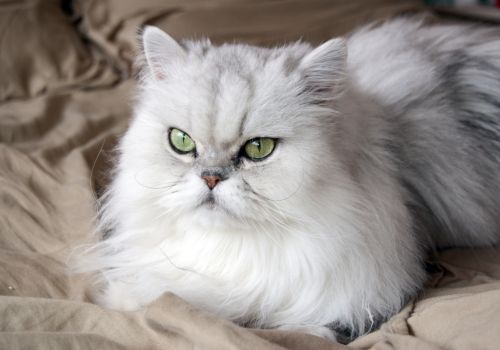Ready to dive into the world of one of the most iconic feline breeds out there? Yep, we're talking about the captivating Persian cat! If you're the proud parent of a Persian kitty, you already know just how special these furballs are. From their sweet demeanor to their luxurious long fur, there's a lot to love—and let's not forget how in-tune they are with our moods. Is it any wonder we're smitten?
Personality Plus: Why We Love Persians
Let's face it, if you chose a Persian—sometimes known as a "Longhair"—you probably had a hunch they'd fit right into your lifestyle. Whether you've got a bustling household full of kids or other four-legged friends, Persians are typically great in social settings. Their voices? Soft as a whisper, which is perfect if you're after a quieter, more laid-back atmosphere. But the true cherry on top has to be their affectionate and easy-going nature that just makes you want to snuggle them all day long!
The Purr-fect Isn't Always Perfect: Know the Quirks
A Persian is a bit of a diva when it comes to grooming. That beautiful, flowing coat won't manage itself, so brace yourself for regular brushing sessions to keep it tangle-free. And while Persians love company, they're not exactly thrilled with the idea of being alone. Solitude is not their cup of tea, so consider their need for social interaction. Then there's the matter of health; they do have a propensity for certain medical issues, but more on that later.
The Historical Catwalk: Persian Roots
Have you ever wondered why they're called Persians? Well, it's not just a fancy name! These cats originally hail from what's now Iran and started making their way west in the 1600s, most likely aboard spice caravans. Over in Britain, they go by the term "Longhair" and, let me tell you, that mane is one of their signature features. But it's not just about the looks; their mellow disposition and playful, yet undemanding nature make them fantastic companions, especially in homes with kiddos and other pets.

Love Knows No Flaws: The Heart of the Matter
So, is being a Persian cat parent worth it? A resounding "Yes!" is the answer you'll hear from anyone who's fallen for their charming personality and cuddle-worthy fluffiness. These cats are more than just a pretty face; they bring warmth, companionship, and endless love into our lives. And let's be honest, their quirks only make us love them even more!
Genetic Predispositions for Persians
Heart Health Matters: Understanding Cardiomyopathy
Cardiomyopathy, or heart muscle disease, can either be a primary condition or a result of other illnesses. One prevalent form is Hypertrophic Cardiomyopathy (HCM), often triggered by an overactive thyroid gland. Another is dilated cardiomyopathy (DCM), usually caused by a taurine deficiency—though, thanks to improvements in cat food, this is much rarer nowadays.
Cat parents, keep your eyes peeled for early warning signs! Rapid breathing, a sudden disinterest in food, or lethargy can be red flags. The challenge? Cats are masters of disguise when it comes to illness. By the time you notice these symptoms, your fur baby might already be in dire straits. A wellness checkup twice a year can catch issues like heart murmurs early on and may include advanced imaging tests for a more accurate diagnosis.
Arterial Thromboembolism: When Blood Clots Strike
A cat with heart disease is at risk for FATE (feline aortic thromboembolisms), a life-threatening situation where blood clots block normal blood flow to the hind legs. The symptoms are scary and sudden, like leg paralysis or pain. Immediate medical attention is a must! The silver lining? Many cats regain full limb function with proper treatment. If your kitty has heart disease, your vet may recommend medications to reduce the risk of clotting.

FLUTD: The Litter Box SOS
Have you noticed your cat urinating outside the litter box? Before you get mad, consider this: your furball might be sending out an SOS. Feline Lower Urinary Tract Diseases (FLUTD) encompass various urinary issues with similar symptoms, like painful urination or blood in the urine. If you spot these signs, it's time for an emergency vet appointment. It's crucial to diagnose and treat FLUTD promptly, as complications like a blocked urethra can be fatal.
Regular exams that include urine testing can help detect early symptoms. Treatments often include medication and specialized diets, and in extreme cases, surgery might be necessary.
The Brachycephalic Syndrome: When Cute Faces Spell Trouble
Owners of Persian cats, listen up! Your cat's adorable flat face might put them at risk for brachycephalic syndrome. This condition makes breathing difficult due to an obstructed airway. The culprits? A long soft palate, narrow nostrils, and sometimes a skinny trachea. Symptoms may include snoring, sleep apnea, and chronic respiratory issues.Early surgical intervention can work wonders and often prevents more serious issues down the line. Make sure to discuss this with your vet, especially if you're already planning to spay or neuter your kitty.
The Mysteries and Marvels of Polycystic Kidney Disease in Cats
Ever heard of Pyruvate Kinase Deficiency (PKD)? It's a puzzling genetic condition primarily recognized in Persian cats. Picture tiny cysts, as small as a pinhead, dotting a kitten's kidneys—and sometimes their liver. These cysts grow over time, wreaking havoc on the affected organs. Usually around the age of seven, symptoms like weight loss, vomiting, and excessive thirst may start to show. The bad news? There's no cure. But there's hope! Early detection can significantly slow down the disease's progression. Yearly urine or blood tests can help catch the signs early, and an ultrasound or genetic test can further assess the damage. Breeders advise not using cats with PKD genes for breeding, so always remember to consult your breeder or vet.
The ABCs of Feline Blood Types
No one wants to imagine their fluffy companion in a life-threatening situation. But in emergencies, knowing your cat's blood type can be a lifesaver—literally! Cats have blood types just like we do, mainly A, B, and very rarely AB. Purebred cats like Persians often have blood types other than A. Speed is of the essence when transfusions are required, so knowing your cat's type in advance can make a huge difference. It's especially important for purebreds to get their blood typed, which can be done during routine wellness checks.
The Dreaded Neonatal Isoerythrolysis (NI)
Sounds like a mouthful, right? NI, Neonatal Isoerythrolysis, is a rare but deadly condition that affects newborn kittens, especially in breeds like Persians that often have type B blood. When a type A kitten nurses from a type B mom, the kitten absorbs antigens that attack its own red blood cells. Tragically, affected kittens usually don't survive past a few days. If you're planning on breeding your cat, consult your vet for advice on how to navigate this issue.
Lysosomal Storage Disease: A Silent Killer
Imagine a waste processing plant suddenly shutting down. That's what happens in Lysosomal Storage Disease (LSD). Affected kittens lack vital enzymes needed to break down waste, leading to toxin accumulation. Symptoms range from poor vision to seizures, and sadly, the disease is always fatal. Close relatives should not be bred to prevent passing on the gene.
The Perils of Portosystemic Shunt
Portosystemic shunt is a disorder that diverts blood around the liver, starving it of essential nutrients. This can lead to dangerous toxins building up in the bloodstream, causing issues like neurological damage. Diagnosis involves blood tests or liver ultrasound scans, and in some cases, surgery can correct the issue.
Mast Cell Tumors: When Skin Bumps Are Not Just Bumps
Mast cell tumors are a type of skin cancer that's hard to distinguish from other skin issues. Don't ignore any lump or bump on your cat; get it checked ASAP! Early surgical removal is crucial for a favorable outcome.
Nasopharyngeal Polyps: The Annoying Growths
Got a Persian cat that seems annoyed for no reason? It might be dealing with nasopharyngeal polyps—abnormal growths due to chronic inflammation. Surgery is the recommended treatment for relief.
 Hip Dysplasia: It's Not Just a Dog Thing
Hip Dysplasia: It's Not Just a Dog Thing
Although more common in dogs, hip dysplasia can also affect Persians. X-rays are essential for early detection. Ask your breeder if the parent cats have been screened for hip dysplasia.
Gingivitis: More Than Just Bad Breath
Gingivitis might seem minor, but it can escalate into severe dental disease. Regular check-ups are essential to catch any oral problems your cat may be hiding.
Separation Anxiety: When Love Turns into Stress
Some Persian cats can become overly attached to their humans, leading to anxiety and destructive behavior when alone. Enrich your cat's environment to keep them entertained during your absence.
Demodicosis: The Invisible Mite Menace
Demodicosis is caused by microscopic mites that can cause itching and red lesions. Your vet can confirm the diagnosis and suggest treatment options like topical medications.
Dystocia: The Challenges of Giving Birth
For some breeds, natural birth is virtually impossible. Persian cat breeders need to be well-informed about the risks and high costs associated with breeding, including the potential need for C-sections.
FeLV and FIP: The Viral Invaders
Both Feline Leukemia Virus (FeLV) and Feline Infectious Peritonitis (FIP) are fatal diseases that require careful monitoring and testing. Vaccinations are available for FeLV, but unfortunately, there's no cure for FIP. Always make sure to ask about any history of these diseases if you're considering adopting a new feline friend.
Don't have a vet in your area yet? We can help you find a local veterinarian.
If you have more questions, the GeniusVets Telehealth platform will give you unlimited access to text and/or video calls with board-certified veterinarians! To learn more click here.
